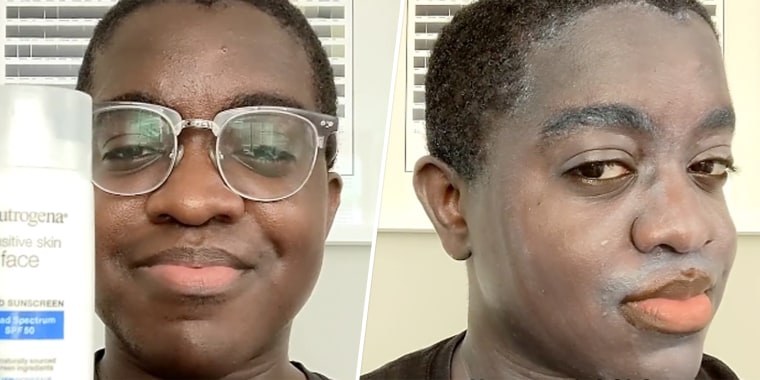A little over a year ago, biomathematician Julian Sass, Ph.D., began to document the seemingly simple task of finding a sunscreen.
But selecting one that works for his dark skin tone is "a hard task," said Sass, who also works in research, education and product development for skin care brand Matter of Fact. And he figured that others could benefit from the trial-and-error process he was putting himself through.
“I thought, ‘OK, I can share this with other people and hopefully this can help someone else,’” he told TODAY. “Now it’s gone farther than I ever imagined.”
Today, Sass maintains a massive, constantly updating sunscreen database with detailed reviews of nearly 300 products. On Instagram, Sass shares videos of himself applying the recommended amount of each sunscreen — which is often a larger amount than commenters realize — along with information about whether the product stings his eyes, has a fragrance or comes with questionable marketing claims.
On his site, Sass bills himself as "a biomathematician, statistician, data scientist, and researcher trying out sunscreens, so you don’t have to."
With his educational background and experience, Sass provides scientific context about how sunscreens are regulated and the proper way to wear them. And as a man with dark skin, he shares the far-too-relatable experience of trying out sunscreens only to find that many of them leave an awkward white cast. It may not be the prettiest work, but the response so far has been "incredible," he said.
So-called "universal" tints usually aren't
People of color are especially likely to develop certain skin conditions, like melasma, that may benefit from the use of tinted sunscreens containing iron oxides, TODAY explained previously. But research shows there's a lack of tinted options available for people with darker skin tones — a fact that Sass's reviews make very clear.
It's especially frustrating for him when brands use terms like "universal tint" or "no white cast" on their products that end up leaving a cast on his skin — even as the beauty industry has made progress in other areas. While it's great that some brands are making foundations and concealers in 30- or 40-plus shades, that's not the norm with sunscreen, Sass said. And it's usually those with the darkest skin tones who are most frequently left out.
"With sun protection, which is something that all skin tones need, there is a real problem," he said. "We still have a ways to go in that realm."
Building community through skin care
Like most of people who grew up with acne, Sass began figuring out what did and didn’t work for his skin from an early age. "It's a tale as old as time," he said. In graduate school, he “had lots of ricochet moments,” which involved exploring different trends in skin care.
During the pandemic, Sass set out to find sunscreens that worked for his skin tone and documented his reviews along the way. He also created posts that explained the basics of specific ingredients and products that he was enjoying at the time. “It was just a nice creative outlet that was different than anything that I had done before,” he said.
Sass “very much did not intend to become an influencer,” but his reviews have helped him build a community of more than 25,000 followers on Instagram.
Brands have used his not-so-positive feedback to improve their products and marketing. And he’s heard from dermatologists and estheticians who show their patients his database to help them find sunscreens that might work for their skin tones, “which just means the world to me,” he said.
Fighting back against sunscreen misinformation
The world of skin care, including SPF, is rife with misinformation. And Sass frequently finds himself addressing fearmongering online and answering basic questions.
"In general, if a brand is trying to sell you something based on fear, for me, that's something that automatically sends up a red flag," he said. "That's a very effective marketing tactic, but one that is just founded in nothing but lies." Ultimately, you should be using products because you enjoy them and they work for you — not because you're scared to use something else, he said.
Within the online chaos, Sass has found a place alongside cosmetic chemists and other experts in the industry who regularly help the public parse the science behind favorite products — and aid in the quest to find even better options. He pointed to Esther Olu, @glowbyramon and @capricorneum.skin as inspirations and said "it is a shock" to be counted among them now.
"I'm able to use my experience working in clinical trials for so many years and bring that to the community," he explained. "I'm eternally grateful to be a part of this skin science community."
Related:

